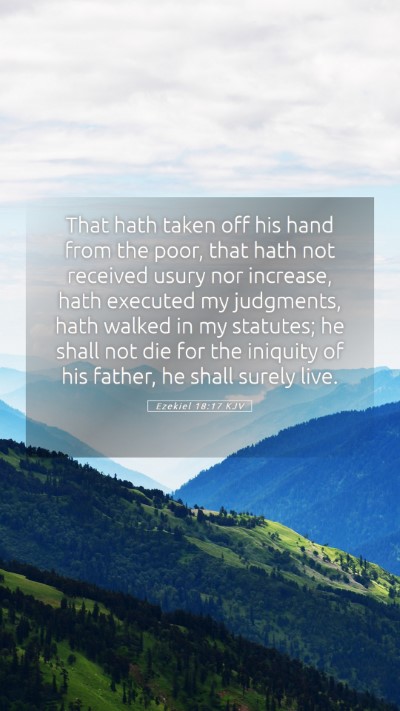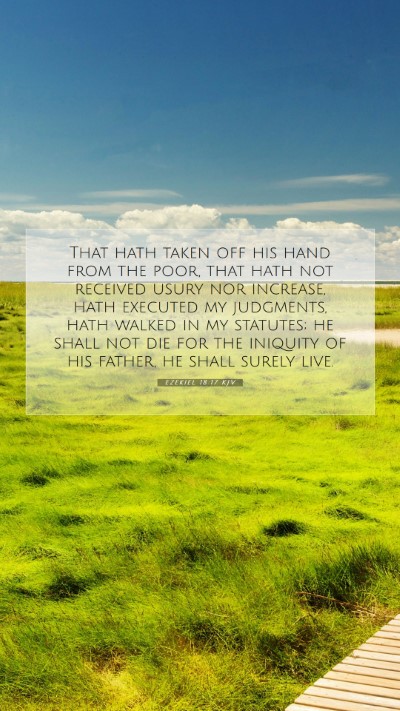Ezekiel 18:17 - Understanding the Meaning of This Verse
Ezekiel 18:17 states, "And that hath taken off his hand from the poor, that hath not received usury nor increase, hath executed my judgments, hath walked in my statutes; he shall not die for the iniquity of his father, he shall surely live." This verse conveys profound biblical truths about justice, mercy, and individual responsibility, central themes in Ezekiel's message. Here, we explore its meaning through various public domain commentaries.
Bible Verse Interpretations
The verse offers a multifaceted perspective on God's justice. It emphasizes personal accountability, illustrating that each person's actions—rather than their parent's sins—determine their fate before God.
Key Insights from Commentaries
-
Matthew Henry:
Henry highlights the principle that God does not punish individuals for the sins of their ancestors but judges them based on their own choices. This assertion underscores the fairness of divine judgment—each person is responsible for their own life, which reflects God's grace.
-
Albert Barnes:
Barnes points out that the verse emphasizes the importance of righteousness and moral conduct. The act of taking off one's hand from the poor suggests a rejection of greed and exploitation, aligning with God’s statutes. This is crucial for receiving God's mercy and living righteously.
-
Adam Clarke:
Clarke interprets this as a focus on social justice, particularly concerning the treatment of the poor. He notes that true righteousness involves not only personal piety but also social responsibility, urging believers to act justly and care for those in need, thereby living in accordance with God’s expectations.
Understanding Scripture: Individual Responsibility
The essence of Ezekiel 18:17 is about the profound truth of individual responsibility in one’s spiritual journey. The verse is a striking reminder that everyone has the opportunity for redemption through their own choices, regardless of their family's past.
Practical Applications
This scripture inspires many to reflect on their conduct in daily life:
- Engage in acts of kindness and fairness, especially towards the less fortunate.
- Reflect on personal accountability and the significance of righteous living.
- Avoid the temptations of greed or exploitation in personal and professional relationships.
Bible Study Insights and Resources
For those seeking to delve deeper into the meaning of this verse, incorporating various Bible study resources can enhance understanding. Here are some suggestions:
- Bible study groups focusing on social justice themes.
- Online Bible study courses that examine Old Testament teachings.
- Bible study guides that provide context and applications for each verse.
Cross References
Several other biblical passages reinforce the themes found in Ezekiel 18:17:
- Deuteronomy 24:14-15: Addresses justice for the poor.
- Jeremiah 31:30: Emphasizes individual responsibility for sin.
- Galatians 6:5: States that each will bear their own load.
Conclusion
Ezekiel 18:17 is a testament to the importance of personal righteousness. This verse invites us to live mindful of our actions and their implications. By engaging with the insights from these rich commentaries, individuals can gain a deeper understanding of Scripture, enhancing their spiritual lives and bringing about meaningful change in their communities.
For further learning, consider exploring the following:
- In-depth Bible verse analysis of individual chapters in Ezekiel.
- The significance of Jesus' teachings related to mercy and justice.
- Understanding difficult Bible passages within the larger context of biblical teaching.


